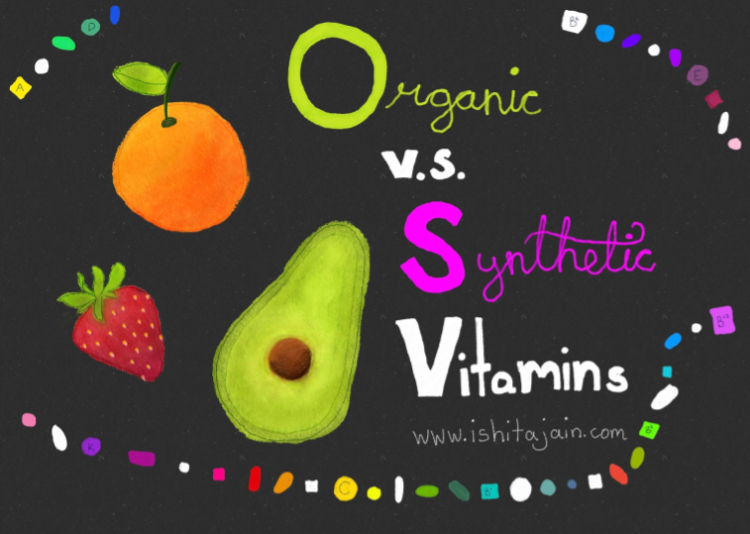Vitamins are organic compounds that aid with bodily functions like metabolism. Fruits and vegetables are filled with natural vitamins, minerals and phytochemicals, but using industrial processes, vitamins can also be produced synthetically. They can come in several forms such as pills, powders, capsules, tablets and gummies. Most vitamin supplements are forms of synthetic vitamins, although there are some that are made of dehydrated and compacted food sources. These types will typically have a list of the ingredients or say 100% plant or animal based on the nutrition label. When discussing these various sources of vitamins, some interesting questions can arise. What are the main differences between synthetic and organic vitamins? And can they be used interchangeably?
Even though synthetic vitamins are produced to perfectly match the chemical structure of natural vitamins, the difference in their manufacturing process ends up having varying impacts on the consumer.
Vitamin food sources are typically an amalgamation of different vitamins, minerals, fibres and acids, and these secondary components are what allow the vitamin to be absorbed by the body. However, with synthetic vitamins, the vitamin is typically isolated, rendering it as less effective. According to Mary Jane Brown, PhD, there have been a number of studies that concluded that organic Vitamin E is absorbed at twice the rate of synthetic Vitamin E.
Additionally, the other components found in fruits and vegetables can build up an immunity that cannot be done with the isolated nature of synthetic vitamins. For example, phytochemicals found in fruits can reduce the risk of heart disease and cancer, but they are not present in synthetic vitamins. Fruits and vegetables themselves can lower the risk of developing brain disorders, and can help lower blood pressure and oxidative stress, which is an imbalance in the production and storage of oxygen in the body. Other foods also hold important properties. The high levels of omega-three found in fish oils can improve heart health. One serving of legumes per day results in a 5% decrease in low density lipoproteins, and a 5-6% decreased risk of heart disease, while four servings of nuts in a week can reduce the risk of heart disease by 28%, and lower the chances of diabetes by 22%. Whole grains carry a mix of the Vitamin Bs as well as iron, magnesium and selenium, helping to protect against cancer, heart disease, diabetes and obesity.
What is important to beware of, is that vitamins that are produced and distributed are not actually reviewed by the FDA. Some vitamin supplements may have more or less of what is mentioned on the nutritional label. Some may even contain products that are not explicitly mentioned.
On the contrary, studies regarding multivitamins have produced conflicting results. Some say that they can reduce the risk of heart disease while others say that they can increase the risk of cancer, especially in smokers. One five-year study revealed that large-doses of multivitamins do nothing to improve a patient’s heart health, while another few studies link multivitamins to better memory in the elderly.
Finally, taking synthetic vitamins can allow you to intake a lot more of a vitamin than is possible with regular food. An overconsumption of vitamins can cause numerous problems. Fat soluble vitamins are stored in the body and can result in hypervitaminosis. Excess amounts of Vitamin A can result in birth defects, excess amounts of both Vitamins A and E can result in premature death, and a high intake of Vitamin B6 can cause nerve damage. Taking 100 times the recommended dietary intake of a vitamin can render anti-seizure medication useless, while taking only five times the recommended dietary intake of zinc, iron, chromium, or selenium can raise the level of toxicity in your body.
There are many myths surrounding the function of vitamins in our body. Some people believe that Vitamin C has the ability to cure colds and that Vitamin E has anti-aging effects and can prevent heart disease, but none of that is true. The truth is that synthetic vitamins are widely misused and misunderstood, and need to be taken with caution.
For the average person, consuming synthetic vitamins is unnecessary, and in some contexts, harmful. They only really provide any real advantage to the elderly, those on the vegetarianism scale, pregnant people, breast feeders, those of child bearing age that have the ability to bear children, and others with nutrient deficiencies. It is vital to consult a dietician before consuming synthetic vitamins because there is so much uncertainty over their effects. But if there is one thing for sure, it is that synthetic vitamins are no replacement for a nutrient-dense, well-balanced diet.



